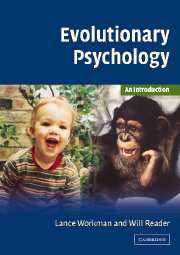Book contents
- Frontmatter
- Contents
- List of figures
- List of tables
- 1 Introduction to evolutionary psychology
- 2 Mechanisms of evolutionary change
- 3 Sexual selection
- 4 The evolution of human mate choice
- 5 Cognitive development and the innateness issue
- 6 Social development
- 7 The evolutionary psychology of social behaviour – kin relationships and conflict
- 8 The evolutionary psychology of social behaviour – reciprocity and group behaviour
- 9 Evolution, thought and cognition
- 10 The evolution of language
- 11 The evolution of emotion
- 12 Evolutionary psychopathology and Darwinian medicine
- 13 Evolutionary psychology and culture
- Glossary
- References
- Index
- References
5 - Cognitive development and the innateness issue
- Frontmatter
- Contents
- List of figures
- List of tables
- 1 Introduction to evolutionary psychology
- 2 Mechanisms of evolutionary change
- 3 Sexual selection
- 4 The evolution of human mate choice
- 5 Cognitive development and the innateness issue
- 6 Social development
- 7 The evolutionary psychology of social behaviour – kin relationships and conflict
- 8 The evolutionary psychology of social behaviour – reciprocity and group behaviour
- 9 Evolution, thought and cognition
- 10 The evolution of language
- 11 The evolution of emotion
- 12 Evolutionary psychopathology and Darwinian medicine
- 13 Evolutionary psychology and culture
- Glossary
- References
- Index
- References
Summary
Key concepts nativism, empiricism, constructivism, epigenetic landscape, imprinting, critical period, sensitive period, Machiavellian intelligence, theory of mind, autism, Williams syndrome, neuroconstructivism, biological preparedness, cortical plasticity
Evolutionary psychology often makes strong claims about innateness, that the child is born with innate mental modules that enable it to develop competencies in areas that have strong fitness implications. For this reason, early cognitive development has become one of the battlegrounds for evolutionary psychologists and their critics. In this chapter we evaluate the modularity hypothesis, introduced in chapter 1, and look at developmental evidence for and against this particular claim of evolutionary psychology. As a result of some evidence that apparently contradicts the notion of innate modules some have concluded that evolutionary psychology itself is untenable. Others, however, propose that modularity is not an essential component of evolutionary psychology and that evolutionary psychology can progress without a commitment to modularity.
Nature, nurture and evolutionary psychology
One of the central debates of developmental psychology is the so-called ‘nature versus nurture’ debate. This asks to what extent human behaviour is the result of environmental factors (nurture) and to what extent it is the result of innate biological factors (nature). This question has a long history, starting at least as early as the Greek philosophers, and has been revisited by a variety of thinkers ever since. Throughout history the pendulum of opinion has swung in favour of one or other of these forces as new theories are developed and evidence accumulated.
- Type
- Chapter
- Information
- Evolutionary PsychologyAn Introduction, pp. 111 - 138Publisher: Cambridge University PressPrint publication year: 2004



